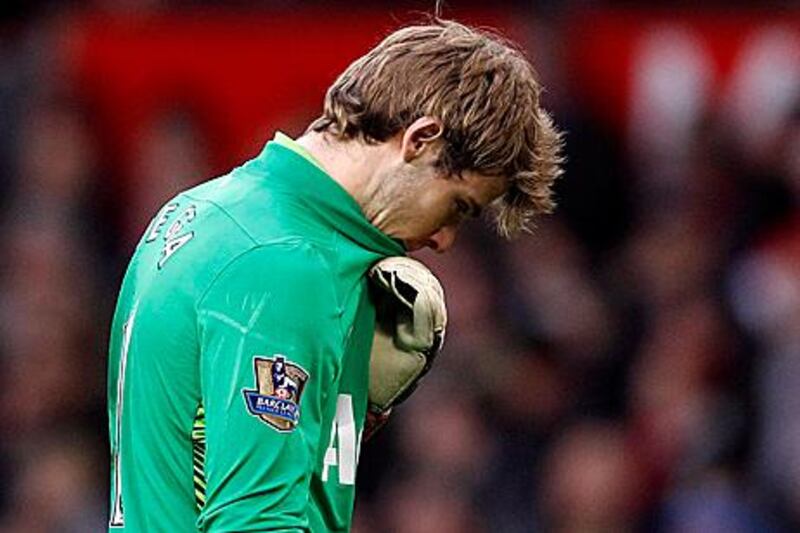It is a tale of two greats and the rest, separated by a gargantuan gulf. In Sir Alex Ferguson's long reign, Manchester United's goalkeepers consist of the exalted pair of Peter Schmeichel and Edwin van der Sar and a group of others who, sooner or later, were found wanting.
It is one reason why replacing Van der Sar was always going to be an unenviable task. Another is the nature of the job: a mishap tends to result in a goal. It is David de Gea's misfortune that his mistakes have started to cost United.
Errors early in the season brought increased scrutiny of the youngster chosen to replace a distinguished veteran, but United won nonetheless. Recent blunders have had a greater impact.
De Gea, 21, was culpable for goals against both Benfica and Basel as United exited the Champions League prematurely.
On Saturday, he flapped at Morten Gamst Pedersen's corner, and was then overpowered by Grant Hanley as the defender headed Blackburn Rovers' winner at Old Trafford.
The problem, in part, was that this was no isolated incident. De Gea had seemed uncomfortable against the aerial ball throughout the afternoon, appearing anxious when set pieces entered the United box.
The goalkeeper who exuded confidence and conviction at Old Trafford was Anders Lindegaard.
The Dane's presence in the penalty area is a reason Ferguson must consider demoting De Gea in favour of his deputy for tomorrow's trip to Newcastle United.
Lindegaard has statistics on his side. He has conceded an average of 0.14 goals per game this season to De Gea's 1.37. Five games into his Premier League career, he is yet to be beaten and he has been reassuringly safe when required.
A year ago, Schmeichel said that his compatriot was not a United keeper. Thus far, that looks a misjudgement from the club's greatest Dane. Lindegaard has impressed on and off the field and, has sensed an opportunity.
Eloquent and assertive in articulating his ambition to become the regular pick, he has never appeared to deem himself Old Trafford's Alexander Doni or Costel Pantilimon, the unseen understudies to the automatic choices at Liverpool and Manchester City, respectively.
With a run of fixtures that includes City and Arsenal, that self-belief could be useful. Twenty-one years ago, Ferguson dropped a fraught figure, Jim Leighton, for the more bubbly Les Sealey, one of the many career-defining decisions he has made. Leighton never forgave Ferguson, but United never looked back after Sealey helped them win the 1990 FA Cup.
Playing for United is not simply a question of skill. Character counts, too, and Ferguson likes goalkeepers with dominant personalities, even if Van der Sar's skill was to radiate calm, and the eccentricities and peccadilloes of Fabien Barthez and Mark Bosnich eventually became too much. At the moment, Lindegaard looks more of a match for the manager than does De Gea.
Yet the equation is more complicated than that. Ferguson went to great lengths to sign the Spaniard.
He had plenty of options.
Last summer was a fine time to recruit a goalkeeper.Manuel Neuer and Maarten Stekelenburg, arguably the world's best and a World Cup finalist respectively, both moved. While the former professed his willingness to remain in Germany, the Roma-bound Stekelenburg, meanwhile, is thought to have received Van der Sar's endorsement.
France's Hugo Lloris and Russia's Igor Akinfeev had both been watched by United. Each is sufficiently young to have at least a decade of high-level football ahead of him.
Ferguson plumped for the least experienced of all, selecting De Gea, then 20, to succeed Van der Sar, 40.
It was a bold choice, a declaration of faith.
But one of Ferguson's most endearing traits is his ability to assess long-term impact. As he celebrated his 70th birthday on Saturday, he indicated his determination to remain at Old Trafford for another three years.
Even if he has underestimated his own remarkable staying power, De Gea will probably peak under his successor. He should prove part of Ferguson's legacy.
There have been indications of his ability, too. A penalty save from Robin van Persie in the 8-2 win over Arsenal was more important than the score suggested. De Gea preserved a point at Anfield by excelling.
Yet a frailty against corners is the sort of shortcoming English sides tend to exploit.
De Gea was far from the sole culprit for Saturday's shock; whoever deputed Dimitar Berbatov to mark Christopher Samba at set pieces shares the responsibility after the Bulgarian conceded a penalty.
Such consolation as the goalkeeper should derive is that, at least, the furore over Wayne Rooney's absence has deflected attention from him. The striker will be in the spotlight again tomorrow when, presumably, he returns to the team.
Yet the more meaningful decision occurs at the other end of the pitch.
Introducing Lindegaard would probably bring a short-term gain, but Ferguson must consider another factor: whether dropping De Gea is a merciful release or a seismic blow to the confidence of his futuristic choice.
@ For more on MANCHESTER UNITED,visit thenational.ae/topics






